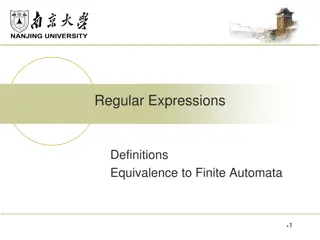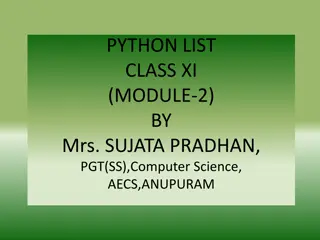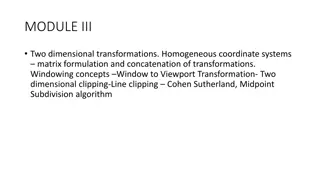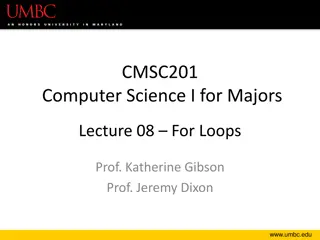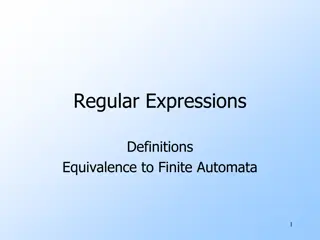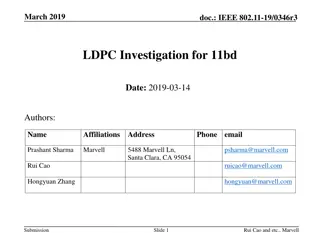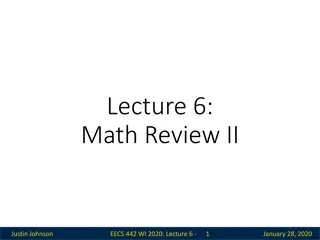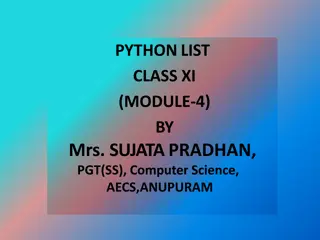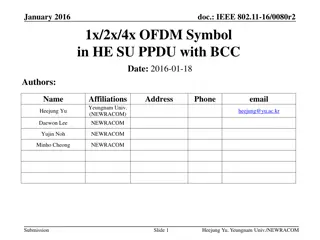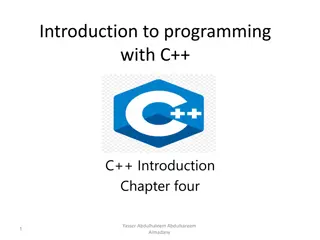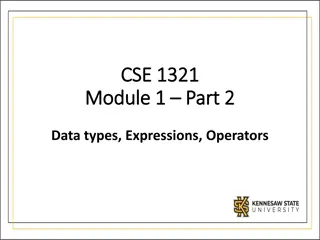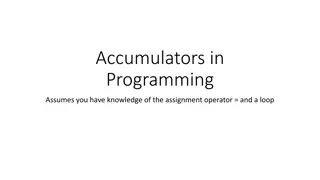Introduction to Regular Expressions and Equivalence to Finite Automata
Regular expressions (REs) are used to describe languages by algebra and are equivalent to finite automata. They define regular languages precisely using operations like union, concatenation, and Kleene star. The concatenation of languages combines strings from two languages, while the Kleene star re
9 views • 106 slides
Python List Operations and Usage in Programming
Lists in Python are versatile data structures that allow storing an ordered sequence of items. This article covers the basics of lists, key operations such as indexing, slicing, concatenation, repetition, membership checks, and traversing lists using loops. Understanding these fundamental concepts i
3 views • 14 slides
Enhancing Information Retrieval with Augmented Generation Models
Augmented generation models, such as REALM and RAG, integrate retrieval and generation tasks to improve information retrieval processes. These models leverage background knowledge and language models to enhance recall and candidate generation. REALM focuses on concatenation and retrieval operations,
2 views • 9 slides
2D Viewing Transformations and Windowing Concepts
Exploring two-dimensional transformations, homogeneous coordinate systems, matrix formulation, and concatenation of transformations. Concepts like windowing, window-to-viewport transformation, viewing transformation, and the 2D viewing pipeline are discussed with relevant images and explanations.
6 views • 38 slides
For Loops in Python: A Comprehensive Overview
This content delves into for loops in Python, covering their syntax, practical applications, and differences from while loops. It explores how for loops can iterate over lists and perform actions a set number of times. Learn about the range() function and updating programs using for loops. Additiona
2 views • 47 slides
Equivalence of Regular Expressions and Finite Automata
Regular expressions are an algebraic method to describe languages, specifically the regular languages. They are defined recursively based on symbols and operations such as concatenation and closure. Precedence rules and examples are also provided. The equivalence between regular expressions and fini
1 views • 25 slides
LDPC Investigation for IEEE 802.11bd Technology in March 2019
In March 2019, the document IEEE 802.11-19/0346r3 delves into the investigation of LDPC (Low-Density Parity-Check) codes for the advancement of 11bd technology. The authors from Marvell explore the potential benefits of LDPC over BCC (Block Code Concatenation) in achieving better sensitivity for 802
0 views • 15 slides
Introduction to Strings in C++ Programming
In C++, strings are arrays of characters that can hold letters, numbers, symbols, and end with a null character '\0'. String manipulation involves operations such as assignment, concatenation, comparison, and input/output. The declaration, initialization, and basic operations on strings like joining
0 views • 24 slides
Strings and Operations in Programming
This content delves into the concepts of strings, their manipulation methods, and various operations related to strings in programming. It covers collection data types, immutable nature of strings, string operations like concatenation and slicing, comparing strings, and practical examples of string
5 views • 29 slides
List Operations in Python
A comprehensive guide to list operations in Python, covering topics such as defining lists, performing functions on lists, indexing, slicing, and more. Learn about the basics of lists, initializing lists, updating elements within a list, deleting list elements, and common list operations like concat
0 views • 26 slides
Math Fundamentals: Matrices and Vectors in EECS 442
Delve into the world of matrices and vectors with a focus on floating-point math, IEEE standards, vector operations, and matrix manipulation in the context of EECS 442 lectures by Justin Johnson. Explore foundational concepts such as concatenation, transpose, cross product, dot product, and the nuan
0 views • 58 slides
Python Lists in Class XI Module-4 by Mrs. Sujata Pradhan
Exploring list structures, characteristics, and operations in Python. Covering topics such as mutability, basic list operations, indexing, slicing, concatenation, repetition, traversal, updation, and comparison. Detailed explanations on list methods like append, extend, insert, index, sort, count, r
0 views • 12 slides
Lists in Python: A Comprehensive Guide
Lists in Python are versatile and essential data structures that allow you to store and manipulate ordered sequences of elements. They are mutable, meaning that you can modify their contents after creation. This guide covers the basics of lists, accessing elements, mutability, and common operations
0 views • 13 slides
Improving Padding Efficiency in HE SU PPDU with BCC
IEEE 802.11-16/0080r2 proposes a method to enhance padding efficiency in High Efficiency Spatially Multiplexed (HE SU) PPDU with Block Concatenation Coding (BCC) in 20MHz transmission. By adjusting the duration of the last OFDM symbol based on the excess information bits, this method aims to reduce
0 views • 17 slides
Collaborative Global-Local Networks for Memory-Efficient Segmentation of Ultra-High Resolution Images
This research project presented at CVPR 2019 by Wuyang Chen, Ziyu Jiang, Zhangyang Wang, Kexin Cui, and Xiaoning Qian focuses on memory-efficient segmentation of ultra-high resolution images using Collaborative Global-Local Networks. The study explores the benefits of employing two branches for deep
0 views • 12 slides
Instant Travel Time Estimation with Sparse Trajectories
This research by Dr. Yu Zheng aims to estimate travel time on road networks instantly using historical and current trajectories generated by vehicles. The methodology involves a context-aware tensor decomposition approach, optimal concatenation, and frequent trajectory pattern mining to address chal
0 views • 21 slides
Introduction to Programming with C++: Strings and Concatenation
This overview delves into the fundamentals of working with strings in C++, covering string declaration, concatenation using the + operator, creating spaces in output, and utilizing the append() function. The importance of including the
0 views • 17 slides
Introduction to Python Data Types, Operators, and Expressions
Understanding data types, expressions, and operators is fundamental in Python programming. Learn about Python's principal built-in types such as numerics, sequences, mappings, and classes. Explore numeric types, strings, and their operations like concatenation, escape sequences, and conversions betw
1 views • 20 slides
String Manipulation in Java: Operations, Indexing, and Methods
The class String in Java provides operations to manipulate strings, where a string is a sequence of characters enclosed in double quotation marks. String operations include indexing, determining string length, concatenation, and various methods such as indexOf, substring, toLowerCase, and toUpperCas
0 views • 17 slides
Accumulators in Programming
Accumulators are a fundamental concept in programming where a variable holds the total of several values by continuously updating its value through operations like addition or concatenation. This concept is often used in loops to keep track of cumulative results or occurrences, akin to using a calcu
0 views • 4 slides
